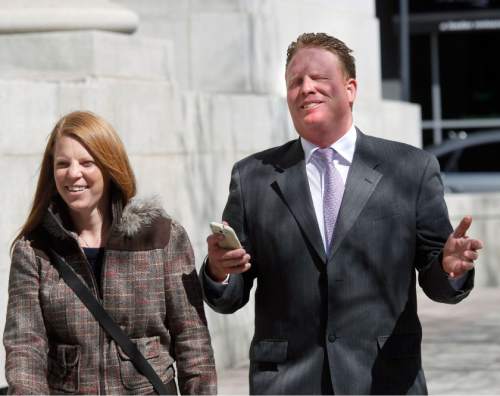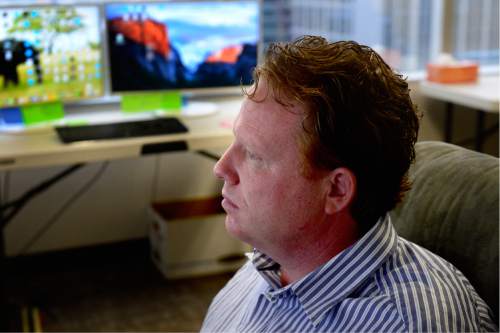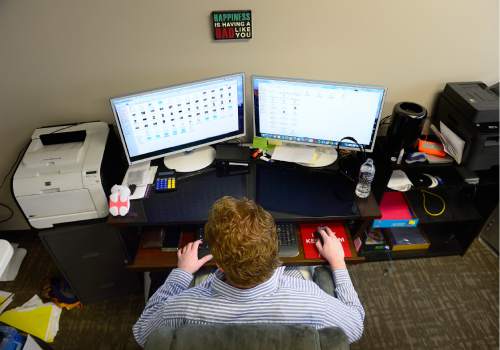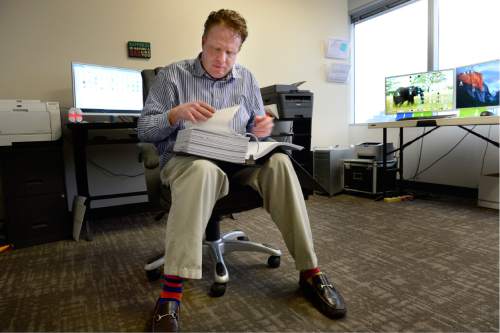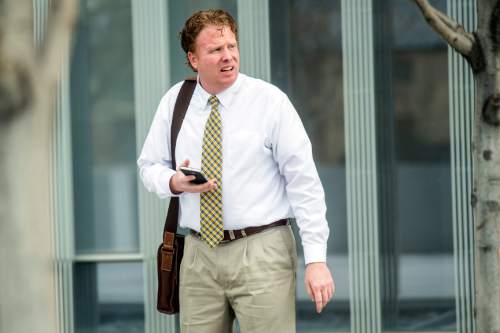This is an archived article that was published on sltrib.com in 2016, and information in the article may be outdated. It is provided only for personal research purposes and may not be reprinted.
After four weeks and a day, federal prosecutors rested their case Monday in the trial of St. George businessman Jeremy Johnson and two co-defendants.
Johnson, who is acting as his own attorney, is scheduled to deliver an opening argument Tuesday morning as he and co-defendants Ryan Riddle and Scott Leavitt begin their effort to persuade the federal court jury to find them not guilty of 86 charges related to alleged bank fraud.
Prosecutors ended their presentation of evidence with testimony from their expert witness who again said that Johnson, Riddle and Leavitt's operation of Johnson's online marketing company exhibited "a clear pattern of deception" that harmed Wells Fargo Bank.
The case revolves around whether the three committed bank fraud by forming what the government calls "shell companies" using the names and personal information of employees, family members and friends to obtain credit card processing accounts from Wells Fargo Bank. That was necessary because the accounts of Johnson's I Works company were shut down due to many credit card chargebacks from consumers, the government contends.
Ken Musante, a former Wells Fargo Bank employee and now co-founder and president of his own credit card processing company in Eureka, Calif., told the jury he believes Wells Fargo was harmed by the failure of Johnson and others to disclose their involvement in the companies used to set up the new accounts.
"It's wrong on so many levels," he said. "It would not be appropriate. The bank needs the proper information in order to underwrite the account."
But it was on those points that the defendants tried to undermine the testimony of Musante, the last scheduled prosecution witness, who said he had been paid $315 an hour by the government and had wracked up a bill of $90,405 for his services.
Attorney Marcus Mumford, who represents Leavitt, hammered away on his cross-examination on the role of a California company called CardFlex Inc., which acted as a sales agent for Wells Fargo Bank and had the ability to approve credit card accounts without consulting the bank.
Johnson contends that CardFlex knew of his involvement in applying for the new accounts, and Mumford pointed to CardFlex documents with Johnson's name and his history of high chargeback rates listed on them.
"I think CardFlex could have done a better job of underwriting these accounts," Musante said, adding later, "There are some questions I think CardFlex should have dug into more deeply."
Mumford also tried to probe deeper on issues the defense has attempted to bring up time and again — the actual role of Wells Fargo in holding the accounts, the reserve funds that were used to pay for any costs and whether the bank actually lost money.
But U.S. District Judge David Nuffer sustained prosecution objections time and again as Mumford tried to get answers.
"Have you heard any evidence connecting Wells Fargo to accounts these funds were kept in?" Mumford asked.
Assistant U.S. Attorney Jason Burt objected as he had done several dozen times — most of those objections were sustained by Nuffer. At one point, Burt objected and added, "And I ask that Mr. Mumford not glare at me after I've objected."
Riddle, who is acting as his own attorney, also tried to press Musante on whether Wells Fargo bore any risk or costs because of CardFlex's role.
"Yes, there is a cost that they bore," Musante said. "I don't know what that cost was, but mathematically it could be figured."
Before trial, prosecutors had admitted that Wells Fargo did not lose money, but it says it's not necessary under federal bank fraud laws to show that it did.
Nuffer has mostly kept the defendants from asking questions about losses through a pretrial order that he again affirmed Monday.
At the close of the government's case, Mumford made a motion, joined by Johnson and Riddle, to dismiss the charges. They argued the government had not presented sufficient evidence to meet all the elements of alleged criminal violations.
But Assistant U.S. Attorney Robert Lunnen said under federal law, Nuffer had to view the evidence as it relates to the motion to dismiss in "a light most favorable to the government."
Nuffer took the motion under advisement.


